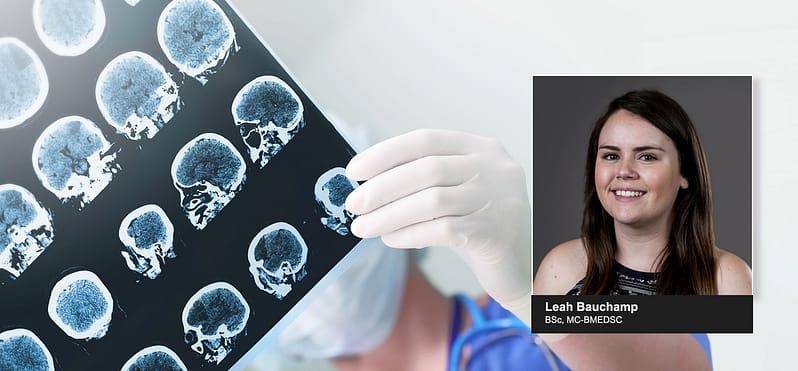Leah Beauchamp is a PhD candidate in the Barnham Laboratory of the Florey Institute of Neuroscience and Mental Health and has spent the last 7 years researching olfactory loss in early Parkinson’s disease.
Having lost a grandfather to Alzheimer’s, Leah decided to pursue a career in neuroscience.
Early in her career she become involved in studies exploring the relationship between the olfactory system and neurodegeneration, in particular pre-clinical diagnosis of Parkinson’s disease.
Cases of Parkinson’s have doubled in the last 20 years and researchers are expecting those numbers to double again in the next 20 years, mainly due to lifestyle and environmental factors.
However, Leah and her colleague Professor Kevin Barnham, recently published a paper in the Journal of Parkinson’s disease warning there may be an even sharper spike than previously predicted, as a result of the COVID-19 pandemic.
Loss of smell, one of the key symptoms of COVID-19, is also one of the primary symptoms of Parkinson’s disease. Witnessed in 90% of patients it indicates potential inflammation of the olfactory bulb in the brain.
Within the team at the Florey, it was Leah herself who identified COVID-19 as a potential primer for Parkinson’s disease.
“We already know that many viruses can induce Parkinson’s by causing inflammation to the brain,” she explains.

While a mosaic of genetic and environmental factors are understood to increase a person’s risk of Parkinson’s disease, the exact cause of the disease remains elusive and is supported by a theory known as the dual-hit hypothesis.
This hypothesis suggests illnesses (such as COVID-19) or injury cause an initial inflammation of the brain which is then further aggravated many years later by either a secondary illness, environmental triggers, such as pollutants and pesticides, or simply old age causing further inflammation to the previously damaged tissues and potentially leading to the development of Parkinson’s.
There is already some evidence for this as a dramatic spike in Parkinson’s cases was witnessed in the years following the Spanish Flu outbreak in the 1920s.
“Loss of smell is often one of the earliest indicators of Parkinson’s. Usually appearing more than a decade before motor symptoms,” Leah explains.
“The co-existence of other symptoms such as sleep disorders, anxiety, depression and constipation can also be a sign of early Parkinson’s,” she explains.
Currently there is no cure for Parkinson’s and treatment solely focuses on managing symptoms. However, Leah and her team are hopeful new research may lead to breakthroughs in early diagnosis and intervention for Parkinson’s.
“With early diagnosis we can start to halt the speed of brain cells deteriorating, potentially preventing some of the more debilitating symptoms.”
The Florey institute are also working on multiple bids to access government funding to conduct further research into this possible connection between COVID-19 and Parkinson’s and establish national screening tools that could make early diagnosis of Parkinson’s disease a reality.
Outside of her research, Leah continues to do what she can to support Parkinson’s research. Participating in Parkinson’s Victoria’s, 27 for Parkinson’s Fundraiser. Committing to walk once a day for 17 days in October [link: https://www.parkinsonswalk.org.au/my-fundraising/2546/leah-beauchamp].
Regular exercise has been proven to be one of the best ways to help manage symptoms.
Leah’s advice for those who suspect they may be at risk?…
“If you’ve had COVID-19 and aren’t recovering as quickly as you’d like, particularly if you experienced loss of smell, we recommend speaking to your GP as soon as possible.”





